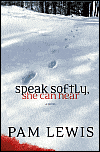Update
I'm sure you're all just dying to know how my "date" with Alexander McCall Smith went. I did get to go (after abandoning my husband and children at a car dealership to deal with men who want to sell us a minivan for way too high a price), and it was a lot of fun. McCall Smith, who lives in Scotland (though he grew up in Africa), arrived in a lurid orange and pea green plaid kilt, complete with green knee socks, green tie, and leather sporran. It was quite a sight. All I can say is, if I were born into that clan, I think I'd farm myself out to be adopted!I was surprised by his accent when he began to speak. I'm not sure what I expected, exactly, but he had quite the posh British accent -- no trace of Scottish until he said the word "bewwwwk" (book). He's in his late 50s, probably (too lazy to go look it up), and he had a very dry sense of humor. He shared anecdotes about the "Really (pronounce "rahly) Terrible Orchestra" that he plays in (that's really it's name -- it's like a high school band for adults who aren't musically inclined but like to play for fun), readers who confronted him with the type of books he ought to write, people he'd met in Africa who had inspired some of his characters, and how he never intended to become a "serial novelist." He also answered questions from the audience.
This is where I found the proceedings somewhat strange. The reason McCall Smith came to town is that Tears of the Giraffe, the second book in the No. 1 Ladies' Detective Agency series, was chosen as "Mobile's Book" this year. You might have heard of this program, in which a city adopts a book and encourages people in the community to read and discuss it, and events are organized around it. It's been spreading across the country; the first I heard about it was when Chicago chose to read To Kill a Mockingbird a few years ago, and last year Long Island selected The Great Gatsby, since it was set on Long Island's Gold Coast. Anyway, I thought Tears was an interesting choice, but I couldn't get anyone to explain to me why it was chosen. While I find the series a good read, and enjoy the books for their incredible description and characters, I'm not sure how "literary" they are. Even a member of the committee who chose it didn't know exactly why they picked that one, except that, she said, the author had to be willing to come to Mobile to give talks.
I thought perhaps choosing a book set in Africa was a nod to the fairly large, but also fairly separate, African American community within the city. This may have been influenced by my seeing an ad for a discussion of the book at a black bookstore (i.e., a bookstore that specializes in black literature). Maybe, I thought, this book was meant to bridge cultural gaps.
If so, I think it may have been a failure. Of about 150-200 people at the free talk given at the library, I'd say approximately 10 of them were African American. And several of those were either employees of the library or of the aforementioned bookstore, which had a table set up to sell copies of the book for signing. And, of course, McCall Smith himself is white.
What I really wanted to ask him to do, but couldn't bring myself to, was to address the issue of writing novels that are so evocative of a culture that really isn't his own. Recently I've been reading Cry, the Beloved Country, a novel set in the 1940s (when it was written) in South Africa that focuses on the racial divide and violence and the difficult (to say the least) circumstances for blacks or "natives" at that time. And yet that, too, was written by a white man. I know that novelists don't have to restrict themselves to writing characters that are just like them -- literature would probably be pretty boring if that were the case -- but it seems such a leap in these instances. And to me, it smacks of at least a little bit of paternalism -- perhaps unconscious paternalism, as I don't want to ascribe negative motives to anyone without giving them the benefit of the doubt -- but paternalism nonetheless. I would really love to have heard the author address that.
Instead, he was asked questions such as, "What does J. L. B. stand for in Mr. Matekoni's name?" (I know the answer but it's supposed to be "confidential") and, "What does red bush tea really taste like?" (in response to which he gave a plug for Republic of Tea's rooibos tea). I did get a chance to ask a question, and I went with the less-confrontational "Why do you think there's so little action in your books [he had previously acknowledged that there was a lot of tea drinking and cake eating]?" follwed up with "Do your editors ever push you to insert more action, climax and denoument and so forth?" He gave very thoughtful answers to my questions, which just made me wish more people had asked some probing questions.
Another racial note came up when I realized that the reception afterward was catered exclusively by African Americans. Again, interesting. I don't know if people down here don't notice it, but I certainly do. Yet I'm not quite willing to bring it to everyone's attention, which makes me feel a little bit cowardly. It's bad enough being a Democrat.





0 comment(s):
location.href=https://www.blogger.com/comment/fullpage/post/6748772/110079169969363739;> Post a comment
<< Home